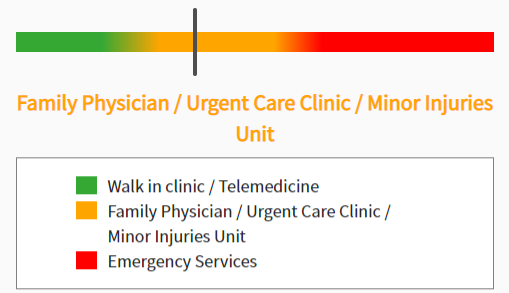Understand your symptoms
Doctors have a vast amount of knowledge to help them, but you are still the person who knows most about your symptoms, and our aim is to make you feel empowered to make suggestions and decide on the best course of action together with your doctor. Here are some tips that can help you through the process.
When in doubt
Often the symptoms may be an unusual presentation of a common condition, or perhaps the condition isn’t very common so the doctor simply didn’t think about it. We all too often accept the first answer we are given without questioning it, even if we doubt it is the correct one: this is the perfect time to use Isabel.
Entering your symptoms into the Symptom Checker will allow you to research all the possible conditions in your own time, and then discuss with your doctor.
If you just can’t decide whether you can wait to see you family doctor or should be going straight away to the Emergency Department, the ‘Where to get care’ triage function can help you make the right decision.

Using Isabel should enable you to say:
Doctor, I know you think I have disease X but could you explain why you don’t think it could be disease Y or Z which have suggested by Isabel and exactly match the symptoms I am experiencing?Talking to your doctor
How should Isabel be used?
Isabel, like any symptom checker, can only suggest some possible conditions based on the symptoms you have entered or help you decide where to get care.
Enter your symptoms in natural language
If you have already seen your doctor about your symptoms, he or she may have told you what the medical terminology is for them. But if not, simply try your best to describe the symptoms that are affecting you.

Start with the most important symptoms
Try to enter the most important and initial symptoms first. You can look at the results, then add others afterwards. This helps you refine your list of conditions without distorting it with symptoms that may not be as relevant.
I am a RN and I think this is the best symptom checker I have seen or used Thank you
Don't be alarmed
When you first see the results you may well be alarmed, but it is important to remember that Isabel's list of suggestions are just possibilities. It is the job of your doctor to work with you to decide which diagnoses are most likely.

How long have you felt unwell?
The common symptoms of cancer are those of many less serious illnesses which is why cancers will often appear in the list and this can be alarming. The key indicator is how long you have had the symptom for; if more than 3 or 4 weeks, you should be talking to your doctor.
With so many conditions and diseases that can be easily missed when assessing patients, there is a critical need for modern technology such as the Isabel Symptom Checker to help patients better understand ………their symptoms and work in collaboration with their GPs.
- Sir Graeme Catto, President of the College of Medicine and former President of the General Medical Council, Daily Mail, October 2012
Knowledge is power
Each condition is linked to various knowledge sources such as the Merck Manual, Medline Plus, Wikipedia, NHS Choices etc. Read up on each condition to see how well your symptoms ‘fit’ and then decide whether to discuss these with your doctor.

Where to get care?
If you feel you should see a health care professional, use 'Where to get care ' to help you decide whether to go to your local Walk-in Clinic, Family Doctor or straight to the Emergency Department. 'Where to get care ' assigns a score to the condition list and your answers to 7 important questions and comes up with a combined score on a colored bar advising where to seek care.

Download our guide
We’ve put together a handy guide to help you. It covers everything from when and how to use the Isabel Symptom Checker, to talking with your doctor.



